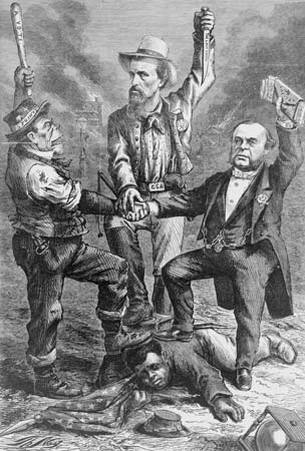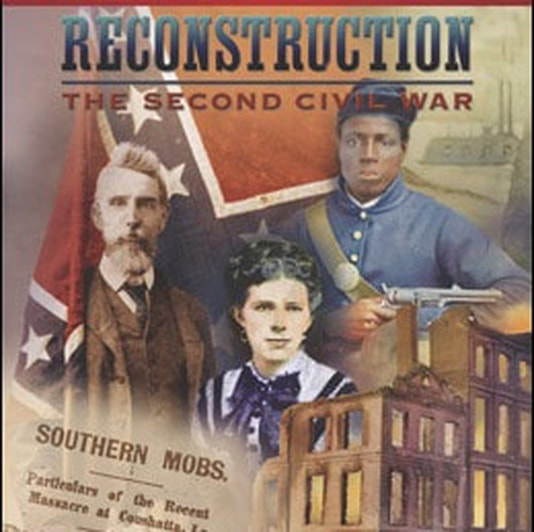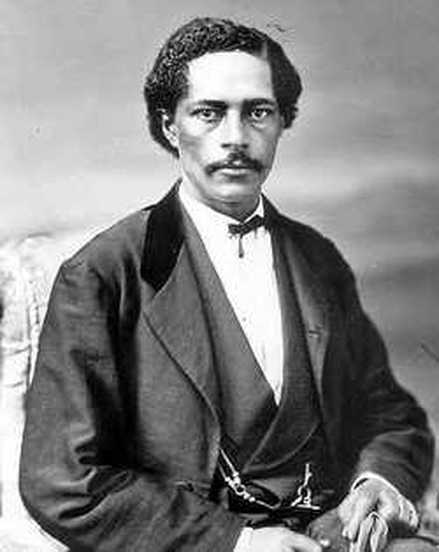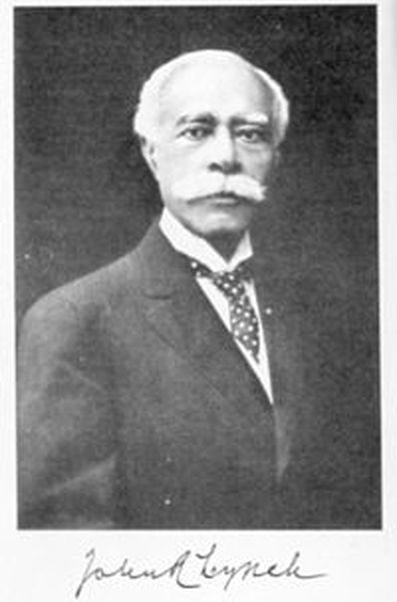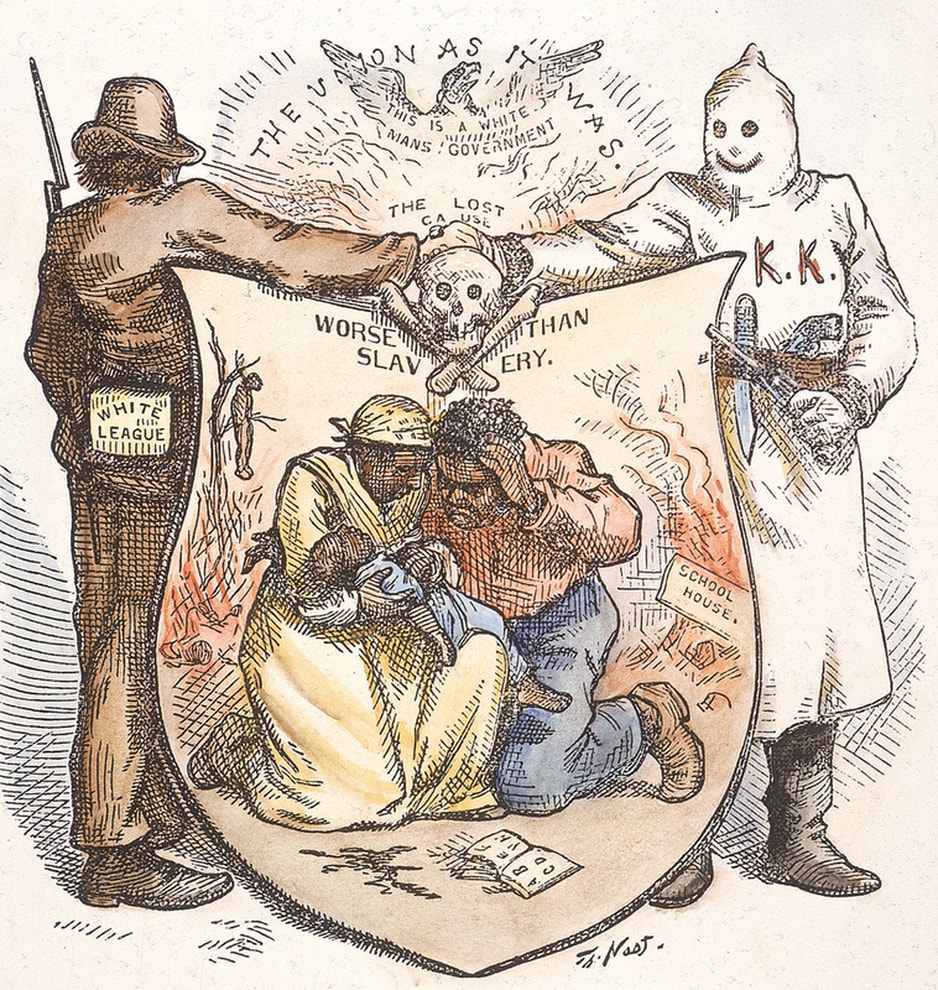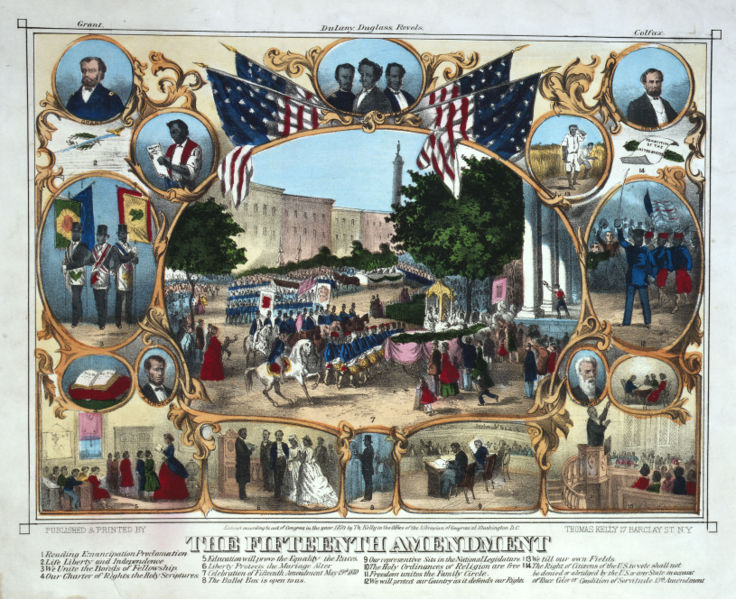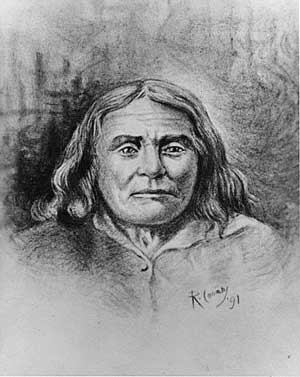IS RECONSTRUCTION IN THE PAST, PRESENT, OR FUTURE?
The Reconstruction is one of the most important topics that we study in this course. We are coming down to the last few weeks of the school year and this Friday we will begin our last few interactive notebooks. The Block schedule for SBAC testing will be long and filled with many subjects so please get your 8 hours of sleep. This is no different than what I have said since the first day of class. Sleep means brain repair and that means a fully functional brain. A sleep deprived brain will not process the information as well as rested brain on a sleep schedule getting 8-10hours, seven days a week is best.
We have now started on Reconstruction. We will go over these cartoons as a class after some more Reconstruction background information. The changes in the South were to help everyone have a path to full rights of Citizenship as the region was re-unified with the North. Please click on these links when assigned and create inputs and outputs. Pre-viewing and looking at them on your own is okay too. As always, please ask for help when needed and follow the social contract. There will be many topics we will have to cover, but America was trying to live up to the ideas of our Republic, Declaration of Independence, and Constitution. Some people in our country did/will try and stop full citizenship to all Americans. This is a history we must understand to see if we have made progress to upholding our ideals into 2018 and beyond. There were obstacles to liberty, justice and freedom:
Remember to keep working in all your class and get sleep. We have one last notebook due on 5/27/16. Also if you missed our discussion on Cinco de Mayo as a Civil War Mexican-American celebration you should read this article. I hope to have the video working before school gets out that I wanted to show you on the May celebration. Next week we will finish the Reconstruction notes and move to Jim Crow, Gilded age, and Ghost Dance era of America. Best of luck. Take care, study, and rest.
http://newsroom.ucla.edu/stories/cinco-de-mayo-just-as-american-271607
We have now started on Reconstruction. We will go over these cartoons as a class after some more Reconstruction background information. The changes in the South were to help everyone have a path to full rights of Citizenship as the region was re-unified with the North. Please click on these links when assigned and create inputs and outputs. Pre-viewing and looking at them on your own is okay too. As always, please ask for help when needed and follow the social contract. There will be many topics we will have to cover, but America was trying to live up to the ideas of our Republic, Declaration of Independence, and Constitution. Some people in our country did/will try and stop full citizenship to all Americans. This is a history we must understand to see if we have made progress to upholding our ideals into 2018 and beyond. There were obstacles to liberty, justice and freedom:
- "In effect, the Klan was a military force serving the interests of the Democratic party, the planter class, and all those who desired the restoration of white supremacy. It aimed to destroy the Republican party’s infrastructure, undermine the Reconstruction state, reestablish control of the black labor force, and restore racial subordination in every aspect of Southern life." Eric Foner. A Short History of Reconstruction (1990) p. 184
Remember to keep working in all your class and get sleep. We have one last notebook due on 5/27/16. Also if you missed our discussion on Cinco de Mayo as a Civil War Mexican-American celebration you should read this article. I hope to have the video working before school gets out that I wanted to show you on the May celebration. Next week we will finish the Reconstruction notes and move to Jim Crow, Gilded age, and Ghost Dance era of America. Best of luck. Take care, study, and rest.
http://newsroom.ucla.edu/stories/cinco-de-mayo-just-as-american-271607
There were obstacles to liberty, justice and freedom:
Links below are for waybacks & our second to last notebook. We will have one more IPN!
1. 1865-1877
2. Definition of Reconstruction
3. 5 myths about Reconstruction
4. Teaching Slavery refresher
5. RECONSTRUCTION AND RIGHTS OF CITIZENSHIP
6. PRESIDENT GRANT 1869-1877
7. ESSENTIAL HISTORICAL QUESTIONS RECAP
8. NEW ORLEANS MASSACRE 1866
9. FIRST AMERICAN TERRORIST GROUP?
10. THE LOST CAUSE
11. THE FACTS ABOUT RECONSTRUCTION
12. Why teach Reconstruction
13. Reconstruction Archives
14. Panic of 1873
- "In effect, the Klan was a military force serving the interests of the Democratic party, the planter class, and all those who desired the restoration of white supremacy. It aimed to destroy the Republican party’s infrastructure, undermine the Reconstruction state, reestablish control of the black labor force, and restore racial subordination in every aspect of Southern life." Eric Foner. A Short History of Reconstruction (1990) p. 184
Links below are for waybacks & our second to last notebook. We will have one more IPN!
1. 1865-1877
2. Definition of Reconstruction
3. 5 myths about Reconstruction
4. Teaching Slavery refresher
5. RECONSTRUCTION AND RIGHTS OF CITIZENSHIP
6. PRESIDENT GRANT 1869-1877
7. ESSENTIAL HISTORICAL QUESTIONS RECAP
8. NEW ORLEANS MASSACRE 1866
9. FIRST AMERICAN TERRORIST GROUP?
10. THE LOST CAUSE
11. THE FACTS ABOUT RECONSTRUCTION
12. Why teach Reconstruction
13. Reconstruction Archives
14. Panic of 1873
If you want to know even more about the topic we studied this a very long recording of his book. John Roy Lynch was a pivitol historical figure and wrote about his perspective on Reconstruction. For Wednesday's Wayback you should choose between our documents A-D that we began working on before Spring break. Please make sure you also got the notes on the end of the Reconstruction: The Second Civil War. The Lost Cause being accepted history has done a huge disservice to those who fought for the Union and those who tried to create an equal society that followed the Declaration of Independence, US Constitution and Bill of Rights.
RECONSTRUCTION: 1865-1877
The Reconstruction is one of the most important topics that we study in this course. We are coming down to the last few weeks of the school year and this Friday we will begin our last few interactive notebooks. The Block schedule for SBAC testing will be long and filled with many subjects so please get your 8 hours of sleep. This is no different than what I have said since the first day of class. Sleep means brain repair and that means a fully functional brain. A sleep deprived brain will not process the information as well as rested brain on a sleep schedule getting 8-10hours, seven days a week is best.
I will add topics for the pages to the last notebooks from here. We still might have 2-3 more interactive personal notebooks. I will add them in the comments section of this page. Any pages outside the chapter 16 I add to the comment section add to your notebook. Please also take notes on the reconstruction video below before you come to class on Wednesday for the Wayback [students missing Wednesday start early you still need to add the Wayback]. Make comments to get help from classmates. The wayback will be two cartoons in the power point that answer the central historical question. Try to remember and think about what we talked about all year even some modern connections.
Please use these buttons when you want to understand more or if I assign as homework.
http://www.slaverybyanothername.com/pbs-film/
Transcript
http://www.pbs.org/wgbh/amex/reconstruction/filmmore/pt.html
I will add topics for the pages to the last notebooks from here. We still might have 2-3 more interactive personal notebooks. I will add them in the comments section of this page. Any pages outside the chapter 16 I add to the comment section add to your notebook. Please also take notes on the reconstruction video below before you come to class on Wednesday for the Wayback [students missing Wednesday start early you still need to add the Wayback]. Make comments to get help from classmates. The wayback will be two cartoons in the power point that answer the central historical question. Try to remember and think about what we talked about all year even some modern connections.
Please use these buttons when you want to understand more or if I assign as homework.
http://www.slaverybyanothername.com/pbs-film/
Transcript
http://www.pbs.org/wgbh/amex/reconstruction/filmmore/pt.html
Below is the picture and link to explain the 15th Amendment:
Reconstruction
The Second Civil War
Part One
Tease
NARRATOR: April 11th, 1865, two days after the end of the Civil War. In the White House, President Abraham Lincoln agonized over his first speech since the defeat of the South. The jubilant crowd outside expected a celebration of the Union victory. Instead, the president warned that "Reconstruction," as he called it, would be "fraught with great difficulty."
EDWARD AYERS, HISTORIAN: The war has spiraled far beyond the worst imaginings of anyone. Over six hundred thousand people had died in the last four years. The largest slave system in the modern world is in shambles and no one knows what is going to replace it. People just can't imagine how they're going to put the country back together again.
DAVID BLIGHT, HISTORIAN: It is a revolutionary, chaotic situation, and the responsibility now was to come up with a plan to restore this society. But you also had to do it with this deep and abiding division over race.
NARRATOR: Three days later, the statesman who led the Union through the Civil War was assassinated. Suddenly, the extraordinary challenge of reconstructing the nation was in the hands of ordinary men and women. A Yankee officer would venture to the most violent corner of Louisiana to try to impose order. A plantation mistress whose slaves were now free would struggle to reclaim her place in the world. A fiery black minister would mount a pitched battle with white landowners. And a new President would force a dramatic showdown with Congress.
ERIC FONER, HISTORIAN: An old order, an old social order has been destroyed; and everything is up for grabs.
CLARENCE WALKER, HISTORIAN: The violence in the South was a way to reestablish white Supremacy. This was a war of terror.
NARRATOR: After four bloody years of Civil War, Americans, North and South would continue to fight over the meaning of freedom, the meaning of citizenship, and the survival of the nation itself.
KATE STONE
READING, Kate Stone: The life we are living now is a miserable, frightened one -- living in constant dread of great danger, not knowing what form it may take, and utterly helpless to protect ourselves.
NARRATOR: Kate Stone was 21-years-old when the Civil War came to her doorstep. In the winter of 1862, Union troops overran Milliken's Bend, only a few miles from Brokenburn, the family's plantation in Louisiana. Stone watched as bluecoats scoured the countryside for food and supplies and ransacked plantations.
AYERS: Before the Civil War, the South would have been among the five richest societies in the world. To the eyes of the South, this is almost this biblical attack. It's like a plague being brought down on the white South. Their sense of self has been shattered just as their property has. Those are the memories that white southerners hold close to them as examples that their enemy were not really honorable men.
NARRATOR: With her father dead and her brothers away fighting for the Confederacy, managing Brokenburn fell to Kate Stone and her mother. The plantation was 1260 acres, with 150 slaves.
DREW GILPIN FAUST, HISTORIAN: Owning 150 slaves meant that they were in the absolute upper echelons of Southern society and Southern wealth. And so she is both a young privileged woman, but she finds herself, essentially, on the battlefield. And sees Yankee troops frequently, runs from Yankee troops.
NARRATOR: Many of her wealthy neighbors abandoned their homes. The Stones clung to their plantation, and determined to wait it out. As frightening to Kate as the federal troops were the black men and women now claiming their freedom.
READING, Kate Stone: Mr. Hardison's Negroes came out today... Six men with their children and clothes walked off in broad daylight after a terrible row, using the most abusive language to Mrs. Hardison.... The other negroes declare they are free, and will leave as soon as they are ready.
NELL PAINTER, HISTORIAN: It was a tremendous shock for many in the planter class to discover, first of all, that the people who worked for them were not happy to work for them, and secondly, sometimes the people who had worked for them were really angry at them.
FAUST: Kate expresses a lot of fear throughout the war, and it's most often fear of armed slaves. "What are they going to do to me, given what we have done to them?"
NARRATOR: Mother and daughter watched as their world was upended, until they could watch no more.
FAUST: This kind of lack of order, lack of control, was the most frightening thing to the Stones, and they thought they had to get away.
READING, Kate Stone: With much difficulty we got everything ready for the start at midnight ... the night was cloudy and dark with occasional claps of thunder, but we had to go then or never.
NARRATOR: From Louisiana, the Stones fled three hundred miles by horseback and boat to Tyler, Texas. There, they joined other wealthy planters, who had also escaped to wait out the war.
READING, Kate Stone: God will aid
Next section Tuesday and Wednesday
NARRATOR: All eyes looked to Washington. Former Confederates held their breath, and steeled themselves for the worst.
AYERS: The South doesn't know what to expect. Will there be punishment for leaders? Will there be land confiscated? Will there be an occupying army? And a lot of people imagined that these traitors, these people who had tried to destroy the United States, should be executed, should be imprisoned.
NARRATOR: No one was sure what to expect from the new president. Andrew Johnson was from Tennessee, but he had fiercely opposed the Confederate secession and was the only southern senator who refused to give up his seat in Congress.
AYERS: Andrew Johnson embodies a lot of the hopes that Abraham Lincoln has that the Union can be put back together easily. But Andrew Johnson had been an outspoken enemy of the big planters, who he blamed for causing secession.
FONER: In Tennessee politics, he saw himself as a spokesman for the poor whites. He owned a slave or two, but he was not a member of the plantation aristocracy. In fact, he resented them very much.
NARRATOR: In his first speech after taking office, Johnson warned that traitors had to be punished. But Johnson shared the white South's desire to keep blacks subordinate. Frederick Douglass, the renowned black leader, got his own impression of Johnson when the two met for the first time at Lincoln's second inaugural.
TUNNELL: The very first expression that came over Johnson's face was one of scorn and derision. And Douglass concluded that that expression was the true index of his heart. Douglass turned to a companion and said, "Whatever else this man may be, he is no friend of our race."
another section first
TWITCHELL/ LABOR CONTRACTS
NARRATOR: In Louisiana, black farmers had leased over ten thousand acres from the Freedmen's Bureau, believing they would soon own them outright. Marshall Twitchell and other Freedmen's Bureau agents delivered a different message: No matter what they'd heard, no forty acres and a mule was coming from this government.
TUNNELL: This is what Presidential Reconstruction is coming to mean. It's telling the freedmen that the government is not going to pamper you. The government is not going to give you any land. You have a hard row ahead of you. Get used to it.
NARRATOR: "Freedom from slavery," Twitchell informed black laborers, "is not freedom from work." His words reflected worries shared by whites North and South: that freed African Americans would not work, and would refuse to go back to the cotton fields.
FONER: What would then happen to the cotton crop of the South? Northern industry needs that cotton. It's still the largest export of the United States. To earn foreign money you need to export cotton. Northerners were not willing to let blacks stop growing cotton.
TUNNELL: Freedmen, I think, probably would have chosen to duck out of the cotton economy all together. You can't eat cotton. For freedmen, becoming an independent landowner is-is a dream. That's their version of the American Dream. But that kind of independence for freedmen, southern planters don't want, the Freedmen's Bureau doesn't want it. Many Northerners in Congress don't want it.
NARRATOR: Across Louisiana, white planters now sat down to draw up labor contracts with the men they used to own.
AYERS: No matter what color your skin is, no matter what your status before the war had been, it's a new order for everybody. No matter what happens politically, you've got to figure out how you're going to feed yourself and your family. That's the back beat. That's the rhythm on which everything else depends.
WALKER: The freed people understand that they're going have to work, but they do not want someone riding around on a horse with a whip curled on his shoulder, as the overseer had done during slavery. And they also do not want to work for low wages.
FAUST: For many white Southerners, negotiating with slaves seemed unimaginable. Because in the very notion of negotiation is an assumption of some kind of equality. And for many white Southerners, they don't have anything to pay them with, because they themselves are on the verge of desperation.
NARRATOR: "There is now nothing between me and the nigger but the dollar, the almighty dollar," said one South Carolina planter, " and I shall make out of him the most I can at the least expense."
TUNNELL: They want submissive, obedient employees. I think in their heart of hearts they want a system that is as close to slavery as possible.
VIOLENCE / BLACK CODES
NARRATOR: Black laborers who insisted on better wages and working conditions were regularly met with threats and violence. Vigilantes lynched whole families, and used the bullwhip on men and women as they had in slavery days. In 1865, more than two thousand black men women and children were reported murdered in Louisiana alone.
WALKER: The violence in the South was a way to reestablish white supremacy.
TUNNELL: These gangs of whites pick out the guy who's trying to save his money, who's trying to get ahead. The man who is an inspiration to other black people in the community -- he's the one that gets murdered. It amounts to systematic culling of alpha males from the black community.
NARRATOR: The southern legal system became an instrument of intimidation. Louisiana, Texas, South Carolina, Mississippi, and Florida passed laws that virtually prohibited freedmen from any work except as field hands. The laws were called "Black Codes." The aim was slavery without the chain.
BLIGHT: The Black Codes were laws passed to control and restrict and constrain the lives of the freed people, essentially rendering them bondsmen again under law.
NARRATOR: Some states made it illegal for freedmen to handle weapons and restricted them from buying or renting land. Black children could be seized from poor families and forced to work in the fields. If a black man had no job, he could be jailed and auctioned to a planter for his labor.
FONER: They make a travesty of the freedom that African Americans have acquired. They are so far from any notion of fairness or freedom that even northerners, who are not egalitarians, say these laws are unacceptable. And so northern Republicans are faced with a dilemma. They don't want to have a big fight with the president, but to accept the idea that Johnson's policy is a success, and accept the Black Codes, they feel means giving up the victory in the Civil War.
NARRATOR: To Louisiana's black veterans, one freedman offered this advice: "I would say to every colored soldier -- bring your gun home."
Section C: in Class
Kate Stone/Big Drunk
NARRATOR: When Radical Reconstruction passed there were still thirty-eight thousand federal troops stationed in the South. In Kate Stone's Louisiana, more than half the regiments were black.
AYERS: Women like Kate Stone look at this and see embodied in black soldiers their greatest fear. These black men, many of whom had been slaves only eighteen months earlier, they wear that uniform as if it's their right, as if they're Americans, too.
FAUST: For white southerners, this is not just politics, it's about your very core being. Congress is going to do certain things, but there's almost a kind of guerilla warfare of the domestic, of the local, of people just refusing to let society change.
WALKER: From the point of view of the white South, the Civil War was a tragic mistake. They had only defended what they understood to be their constitutional rights; it was not that they had disrupted the Union, engaged in an act of treason. They felt the North was a vicious aggressor, committed to a perversion, which was black equality. This sense of grievance and sense of injustice only grew. That this was something not to be accepted
Remember, Cinco de Mayo is a Civil War celebration. Students at Knotts Berry Farm we watched 7 minutes.
Here is the transcript:
ALL other students might check the first couple of ideas to add to the notebook. Also check all input notes.
Good luck
1873 INAUGURAL
NARRATOR: In March 1873, on one of the coldest evenings in Washington history, Ulysses S. Grant celebrated a landslide victory. His crackdown on the Klan had been popular with many Northerners and helped him win a second term. "The States lately at war with the General Government," he announced confidently, "are now rehabilitated." For the first time in American history, blacks had been invited to the inaugural ball.
BLIGHT: It's an extraordinary moment in Congress for black Congressmen. There were seven black Congressmen from southern states, serving in the US House of Representatives -- one of whom was John Roy Lynch.
NARRATOR: After two years in the Mississippi legislature, Lynch was elected to Congress. Just twenty-five, he was the youngest member of the U.S. House. Only ten years before, Lynch had been a slave. Now he was a Congressman, part of a generation of Republican legislators trying to build a new South.
AYERS: The Republicans say, "We're not just trying to do things for black people. We're trying to improve the entire economy and fairness for all people." These railroads aren't just going to help black people. And somebody is going to have to take care of ill people who can't take care of themselves. You poorer white families would also like to have schools for your children, wouldn't you?" This is a chance for a new South to emerge.
TUNIS CAMPBELL IN COURT
NARRATOR: In Georgia, Tunis Campbell had moved beyond organizing laborers. He was now rewriting the codes of behavior for freedmen.
DUNCAN: Tunis Campbell was determined not to let whites overcome blacks in areas that he could control. Couldn't control what was going on at the state level any more. Couldn't control what was going on at the national level. But on the local level, uh, through his office, he could make decisions that affected people's lives on a daily basis.
NARRATOR: Campbell told freedmen they did not have to yield to whites when they passed on the sidewalk, and they no longer had to address them as master and mistress. In Campbell's district, some blacks were even seen carrying hunting rifles.
NELSON: I do believe that Tunis Campbell aimed to be at least a little provocative. He was very idealistic about the possibilities for African American citizenship. But at the same time very savvy about the nature of power relations.
NARRATOR: Whites in the county were significantly outnumbered, and feared a black uprising. Fan Butler was terrified.
READING, FAN BUTLER: The Negroes seemed to reach the climax of lawless independence. I never slept without a loaded pistol by my bed.
DUNCAN: Democrats were relentless in their efforts to depose him. He's too famous to kill. They can't kill him. They're afraid of that. They're afraid of what might happen in the local community. So they kept him involved in a myriad of lawsuits, charging him with abusing his office.
NARRATOR: Whatever the charges, Campbell's real offense, according to court documents, was seeking to "give the Negro supremacy over the white man." Campbell was incensed.
READING, TUNIS CAMPBELL: Just before every election they commence trying to intimidate by arresting all prominent colored men. As usual they have arrested me again.... The intention was to keep me out of my seat in the senate."
DUNCAN: When Campbell's called to trial, his lieutenants send out word, and African Americans come off the plantations. They stop work, they go home and get their shotguns, and they arrive at the courthouse. The wives come and children come as well, and they clog the streets with black bodies, saying emphatically to the white community, "Don't touch our man."
NARRATOR: In one tense hearing, the courtroom was packed with Campbell supporters. The judge released him. "If they had put him in jail," a white witness would later comment, "the niggers would have put the jail in the river."
CORRUPTION AND CRASH
NARRATOR: In early 1873, a series of articles began to appear in the New York Tribune. Black lawmakers in South Carolina, the newspaper declared, were plundering the treasury. All through that winter, fresh accusations surfaced. The charges were highly exaggerated, but they contained an element of truth.
FONER: A lot more money is flowing through these state governments; they're doing a lot more things than the governments had in the past. And also, a lot of the Republican legislators are not people with any significant livelihood, other than being an office holder. And so there begins to develop this sense of, "Well, make some money while you can."
NARRATOR: In the North, corruption was just as widespread -- but South Carolina, the only state with a black majority legislature, was an easy target. The accusati
NARRATOR: In the North, corruption was just as widespread -- but South Carolina, the only state with a black majority legislature, was an easy target. The accusations fueled anti-black feeling in the North, and added to a growing sense that Reconstruction had been a terrible mistake. That fall, frightening news from Wall Street gripped the North, and eclipsed the troubled conversation about Reconstruction. The nation's biggest banking house declared bankruptcy, and the North's overheated economy crashed. Thousands of businesses failed; a million people were thrown out of work. In the terrible depression that followed, Northerners had little patience for the plight of Southern blacks. Increasingly, they were falling under the spell of a more romantic idea of the South -- a growing legend of a lost civilization.
SOUTHERN MEMORIALS & TOURISM
AYERS: White northerners begin to sympathize with the ideals of the white South. Yes, there was a time in United States when life was not all about money. Yes, there was a time when there was an aristocracy. And you find that white northerners as well as white southerners love these ideas, deep into the twentieth century.
NARRATOR: It came to be called the Lost Cause. The white South's own version of its history became a kind of civic religion. White southerners began to build memorials, consecrate battlefields -- it was their way of dealing with loss.
DREW GILPIN FAUST, HISTORIAN: Eighteen percent of white southern men of military age are killed in the war. Eighty thousand widows in Alabama, applying for support and aid. One of the things they want to do is, simply on an emotional level, cope with all that death and somehow reclaim the meaning of those deaths. But to honor the dead you have to enhance the cause. So this wasn't simply about the loved ones, it was also about the cause for which they died.
AYERS: The Lost Cause is a celebration of what white southerners see as the best of the Confederacy: its nobility, its Christian virtues, its leadership, the loyalty of its men.
BLIGHT: They basically began to forge the Confederate Lost Cause as not a story about loss but a story about victory. They might have lost the war, but they were now winning the ultimate victory, over control of their own society and against Reconstruction.
NARRATOR: Democrats took back power in Virginia, North Carolina, Tennessee, Georgia, Alabama, Arkansas, Texas. White Southerners called it "Redemption". Many of the elections were won through violence and intimidation. White Northerners did nothing to stop it
This is very important idea to understand the struggle for civil rights:
The withdrawal of the troops symbolized the end of Reconstruction, but an earlier Supreme Court case had made clear that the legal system would resist a broad reading of the Fourteenth Amendment. In the slaughterhouse cases, 83 U.S. 36, 21 L.Ed. 394 (1873), the Supreme Court read the amendment's privileges and immunities clause virtually out of the Constitution. The Court effectively closed the door on the concept of privileges and immunities as an enforcement tool against state laws that restricted individual civil rights. On a 5–4 vote, the Court interpreted the clause as protecting only rights of national citizenship from the actions of the state government. This restrictive reading robbed the Privileges and Immunities Clause of any constitutional significance.
The Second Civil War
Part One
Tease
NARRATOR: April 11th, 1865, two days after the end of the Civil War. In the White House, President Abraham Lincoln agonized over his first speech since the defeat of the South. The jubilant crowd outside expected a celebration of the Union victory. Instead, the president warned that "Reconstruction," as he called it, would be "fraught with great difficulty."
EDWARD AYERS, HISTORIAN: The war has spiraled far beyond the worst imaginings of anyone. Over six hundred thousand people had died in the last four years. The largest slave system in the modern world is in shambles and no one knows what is going to replace it. People just can't imagine how they're going to put the country back together again.
DAVID BLIGHT, HISTORIAN: It is a revolutionary, chaotic situation, and the responsibility now was to come up with a plan to restore this society. But you also had to do it with this deep and abiding division over race.
NARRATOR: Three days later, the statesman who led the Union through the Civil War was assassinated. Suddenly, the extraordinary challenge of reconstructing the nation was in the hands of ordinary men and women. A Yankee officer would venture to the most violent corner of Louisiana to try to impose order. A plantation mistress whose slaves were now free would struggle to reclaim her place in the world. A fiery black minister would mount a pitched battle with white landowners. And a new President would force a dramatic showdown with Congress.
ERIC FONER, HISTORIAN: An old order, an old social order has been destroyed; and everything is up for grabs.
CLARENCE WALKER, HISTORIAN: The violence in the South was a way to reestablish white Supremacy. This was a war of terror.
NARRATOR: After four bloody years of Civil War, Americans, North and South would continue to fight over the meaning of freedom, the meaning of citizenship, and the survival of the nation itself.
KATE STONE
READING, Kate Stone: The life we are living now is a miserable, frightened one -- living in constant dread of great danger, not knowing what form it may take, and utterly helpless to protect ourselves.
NARRATOR: Kate Stone was 21-years-old when the Civil War came to her doorstep. In the winter of 1862, Union troops overran Milliken's Bend, only a few miles from Brokenburn, the family's plantation in Louisiana. Stone watched as bluecoats scoured the countryside for food and supplies and ransacked plantations.
AYERS: Before the Civil War, the South would have been among the five richest societies in the world. To the eyes of the South, this is almost this biblical attack. It's like a plague being brought down on the white South. Their sense of self has been shattered just as their property has. Those are the memories that white southerners hold close to them as examples that their enemy were not really honorable men.
NARRATOR: With her father dead and her brothers away fighting for the Confederacy, managing Brokenburn fell to Kate Stone and her mother. The plantation was 1260 acres, with 150 slaves.
DREW GILPIN FAUST, HISTORIAN: Owning 150 slaves meant that they were in the absolute upper echelons of Southern society and Southern wealth. And so she is both a young privileged woman, but she finds herself, essentially, on the battlefield. And sees Yankee troops frequently, runs from Yankee troops.
NARRATOR: Many of her wealthy neighbors abandoned their homes. The Stones clung to their plantation, and determined to wait it out. As frightening to Kate as the federal troops were the black men and women now claiming their freedom.
READING, Kate Stone: Mr. Hardison's Negroes came out today... Six men with their children and clothes walked off in broad daylight after a terrible row, using the most abusive language to Mrs. Hardison.... The other negroes declare they are free, and will leave as soon as they are ready.
NELL PAINTER, HISTORIAN: It was a tremendous shock for many in the planter class to discover, first of all, that the people who worked for them were not happy to work for them, and secondly, sometimes the people who had worked for them were really angry at them.
FAUST: Kate expresses a lot of fear throughout the war, and it's most often fear of armed slaves. "What are they going to do to me, given what we have done to them?"
NARRATOR: Mother and daughter watched as their world was upended, until they could watch no more.
FAUST: This kind of lack of order, lack of control, was the most frightening thing to the Stones, and they thought they had to get away.
READING, Kate Stone: With much difficulty we got everything ready for the start at midnight ... the night was cloudy and dark with occasional claps of thunder, but we had to go then or never.
NARRATOR: From Louisiana, the Stones fled three hundred miles by horseback and boat to Tyler, Texas. There, they joined other wealthy planters, who had also escaped to wait out the war.
READING, Kate Stone: God will aid
Next section Tuesday and Wednesday
NARRATOR: All eyes looked to Washington. Former Confederates held their breath, and steeled themselves for the worst.
AYERS: The South doesn't know what to expect. Will there be punishment for leaders? Will there be land confiscated? Will there be an occupying army? And a lot of people imagined that these traitors, these people who had tried to destroy the United States, should be executed, should be imprisoned.
NARRATOR: No one was sure what to expect from the new president. Andrew Johnson was from Tennessee, but he had fiercely opposed the Confederate secession and was the only southern senator who refused to give up his seat in Congress.
AYERS: Andrew Johnson embodies a lot of the hopes that Abraham Lincoln has that the Union can be put back together easily. But Andrew Johnson had been an outspoken enemy of the big planters, who he blamed for causing secession.
FONER: In Tennessee politics, he saw himself as a spokesman for the poor whites. He owned a slave or two, but he was not a member of the plantation aristocracy. In fact, he resented them very much.
NARRATOR: In his first speech after taking office, Johnson warned that traitors had to be punished. But Johnson shared the white South's desire to keep blacks subordinate. Frederick Douglass, the renowned black leader, got his own impression of Johnson when the two met for the first time at Lincoln's second inaugural.
TUNNELL: The very first expression that came over Johnson's face was one of scorn and derision. And Douglass concluded that that expression was the true index of his heart. Douglass turned to a companion and said, "Whatever else this man may be, he is no friend of our race."
another section first
TWITCHELL/ LABOR CONTRACTS
NARRATOR: In Louisiana, black farmers had leased over ten thousand acres from the Freedmen's Bureau, believing they would soon own them outright. Marshall Twitchell and other Freedmen's Bureau agents delivered a different message: No matter what they'd heard, no forty acres and a mule was coming from this government.
TUNNELL: This is what Presidential Reconstruction is coming to mean. It's telling the freedmen that the government is not going to pamper you. The government is not going to give you any land. You have a hard row ahead of you. Get used to it.
NARRATOR: "Freedom from slavery," Twitchell informed black laborers, "is not freedom from work." His words reflected worries shared by whites North and South: that freed African Americans would not work, and would refuse to go back to the cotton fields.
FONER: What would then happen to the cotton crop of the South? Northern industry needs that cotton. It's still the largest export of the United States. To earn foreign money you need to export cotton. Northerners were not willing to let blacks stop growing cotton.
TUNNELL: Freedmen, I think, probably would have chosen to duck out of the cotton economy all together. You can't eat cotton. For freedmen, becoming an independent landowner is-is a dream. That's their version of the American Dream. But that kind of independence for freedmen, southern planters don't want, the Freedmen's Bureau doesn't want it. Many Northerners in Congress don't want it.
NARRATOR: Across Louisiana, white planters now sat down to draw up labor contracts with the men they used to own.
AYERS: No matter what color your skin is, no matter what your status before the war had been, it's a new order for everybody. No matter what happens politically, you've got to figure out how you're going to feed yourself and your family. That's the back beat. That's the rhythm on which everything else depends.
WALKER: The freed people understand that they're going have to work, but they do not want someone riding around on a horse with a whip curled on his shoulder, as the overseer had done during slavery. And they also do not want to work for low wages.
FAUST: For many white Southerners, negotiating with slaves seemed unimaginable. Because in the very notion of negotiation is an assumption of some kind of equality. And for many white Southerners, they don't have anything to pay them with, because they themselves are on the verge of desperation.
NARRATOR: "There is now nothing between me and the nigger but the dollar, the almighty dollar," said one South Carolina planter, " and I shall make out of him the most I can at the least expense."
TUNNELL: They want submissive, obedient employees. I think in their heart of hearts they want a system that is as close to slavery as possible.
VIOLENCE / BLACK CODES
NARRATOR: Black laborers who insisted on better wages and working conditions were regularly met with threats and violence. Vigilantes lynched whole families, and used the bullwhip on men and women as they had in slavery days. In 1865, more than two thousand black men women and children were reported murdered in Louisiana alone.
WALKER: The violence in the South was a way to reestablish white supremacy.
TUNNELL: These gangs of whites pick out the guy who's trying to save his money, who's trying to get ahead. The man who is an inspiration to other black people in the community -- he's the one that gets murdered. It amounts to systematic culling of alpha males from the black community.
NARRATOR: The southern legal system became an instrument of intimidation. Louisiana, Texas, South Carolina, Mississippi, and Florida passed laws that virtually prohibited freedmen from any work except as field hands. The laws were called "Black Codes." The aim was slavery without the chain.
BLIGHT: The Black Codes were laws passed to control and restrict and constrain the lives of the freed people, essentially rendering them bondsmen again under law.
NARRATOR: Some states made it illegal for freedmen to handle weapons and restricted them from buying or renting land. Black children could be seized from poor families and forced to work in the fields. If a black man had no job, he could be jailed and auctioned to a planter for his labor.
FONER: They make a travesty of the freedom that African Americans have acquired. They are so far from any notion of fairness or freedom that even northerners, who are not egalitarians, say these laws are unacceptable. And so northern Republicans are faced with a dilemma. They don't want to have a big fight with the president, but to accept the idea that Johnson's policy is a success, and accept the Black Codes, they feel means giving up the victory in the Civil War.
NARRATOR: To Louisiana's black veterans, one freedman offered this advice: "I would say to every colored soldier -- bring your gun home."
Section C: in Class
Kate Stone/Big Drunk
NARRATOR: When Radical Reconstruction passed there were still thirty-eight thousand federal troops stationed in the South. In Kate Stone's Louisiana, more than half the regiments were black.
AYERS: Women like Kate Stone look at this and see embodied in black soldiers their greatest fear. These black men, many of whom had been slaves only eighteen months earlier, they wear that uniform as if it's their right, as if they're Americans, too.
FAUST: For white southerners, this is not just politics, it's about your very core being. Congress is going to do certain things, but there's almost a kind of guerilla warfare of the domestic, of the local, of people just refusing to let society change.
WALKER: From the point of view of the white South, the Civil War was a tragic mistake. They had only defended what they understood to be their constitutional rights; it was not that they had disrupted the Union, engaged in an act of treason. They felt the North was a vicious aggressor, committed to a perversion, which was black equality. This sense of grievance and sense of injustice only grew. That this was something not to be accepted
Remember, Cinco de Mayo is a Civil War celebration. Students at Knotts Berry Farm we watched 7 minutes.
Here is the transcript:
ALL other students might check the first couple of ideas to add to the notebook. Also check all input notes.
Good luck
1873 INAUGURAL
NARRATOR: In March 1873, on one of the coldest evenings in Washington history, Ulysses S. Grant celebrated a landslide victory. His crackdown on the Klan had been popular with many Northerners and helped him win a second term. "The States lately at war with the General Government," he announced confidently, "are now rehabilitated." For the first time in American history, blacks had been invited to the inaugural ball.
BLIGHT: It's an extraordinary moment in Congress for black Congressmen. There were seven black Congressmen from southern states, serving in the US House of Representatives -- one of whom was John Roy Lynch.
NARRATOR: After two years in the Mississippi legislature, Lynch was elected to Congress. Just twenty-five, he was the youngest member of the U.S. House. Only ten years before, Lynch had been a slave. Now he was a Congressman, part of a generation of Republican legislators trying to build a new South.
AYERS: The Republicans say, "We're not just trying to do things for black people. We're trying to improve the entire economy and fairness for all people." These railroads aren't just going to help black people. And somebody is going to have to take care of ill people who can't take care of themselves. You poorer white families would also like to have schools for your children, wouldn't you?" This is a chance for a new South to emerge.
TUNIS CAMPBELL IN COURT
NARRATOR: In Georgia, Tunis Campbell had moved beyond organizing laborers. He was now rewriting the codes of behavior for freedmen.
DUNCAN: Tunis Campbell was determined not to let whites overcome blacks in areas that he could control. Couldn't control what was going on at the state level any more. Couldn't control what was going on at the national level. But on the local level, uh, through his office, he could make decisions that affected people's lives on a daily basis.
NARRATOR: Campbell told freedmen they did not have to yield to whites when they passed on the sidewalk, and they no longer had to address them as master and mistress. In Campbell's district, some blacks were even seen carrying hunting rifles.
NELSON: I do believe that Tunis Campbell aimed to be at least a little provocative. He was very idealistic about the possibilities for African American citizenship. But at the same time very savvy about the nature of power relations.
NARRATOR: Whites in the county were significantly outnumbered, and feared a black uprising. Fan Butler was terrified.
READING, FAN BUTLER: The Negroes seemed to reach the climax of lawless independence. I never slept without a loaded pistol by my bed.
DUNCAN: Democrats were relentless in their efforts to depose him. He's too famous to kill. They can't kill him. They're afraid of that. They're afraid of what might happen in the local community. So they kept him involved in a myriad of lawsuits, charging him with abusing his office.
NARRATOR: Whatever the charges, Campbell's real offense, according to court documents, was seeking to "give the Negro supremacy over the white man." Campbell was incensed.
READING, TUNIS CAMPBELL: Just before every election they commence trying to intimidate by arresting all prominent colored men. As usual they have arrested me again.... The intention was to keep me out of my seat in the senate."
DUNCAN: When Campbell's called to trial, his lieutenants send out word, and African Americans come off the plantations. They stop work, they go home and get their shotguns, and they arrive at the courthouse. The wives come and children come as well, and they clog the streets with black bodies, saying emphatically to the white community, "Don't touch our man."
NARRATOR: In one tense hearing, the courtroom was packed with Campbell supporters. The judge released him. "If they had put him in jail," a white witness would later comment, "the niggers would have put the jail in the river."
CORRUPTION AND CRASH
NARRATOR: In early 1873, a series of articles began to appear in the New York Tribune. Black lawmakers in South Carolina, the newspaper declared, were plundering the treasury. All through that winter, fresh accusations surfaced. The charges were highly exaggerated, but they contained an element of truth.
FONER: A lot more money is flowing through these state governments; they're doing a lot more things than the governments had in the past. And also, a lot of the Republican legislators are not people with any significant livelihood, other than being an office holder. And so there begins to develop this sense of, "Well, make some money while you can."
NARRATOR: In the North, corruption was just as widespread -- but South Carolina, the only state with a black majority legislature, was an easy target. The accusati
NARRATOR: In the North, corruption was just as widespread -- but South Carolina, the only state with a black majority legislature, was an easy target. The accusations fueled anti-black feeling in the North, and added to a growing sense that Reconstruction had been a terrible mistake. That fall, frightening news from Wall Street gripped the North, and eclipsed the troubled conversation about Reconstruction. The nation's biggest banking house declared bankruptcy, and the North's overheated economy crashed. Thousands of businesses failed; a million people were thrown out of work. In the terrible depression that followed, Northerners had little patience for the plight of Southern blacks. Increasingly, they were falling under the spell of a more romantic idea of the South -- a growing legend of a lost civilization.
SOUTHERN MEMORIALS & TOURISM
AYERS: White northerners begin to sympathize with the ideals of the white South. Yes, there was a time in United States when life was not all about money. Yes, there was a time when there was an aristocracy. And you find that white northerners as well as white southerners love these ideas, deep into the twentieth century.
NARRATOR: It came to be called the Lost Cause. The white South's own version of its history became a kind of civic religion. White southerners began to build memorials, consecrate battlefields -- it was their way of dealing with loss.
DREW GILPIN FAUST, HISTORIAN: Eighteen percent of white southern men of military age are killed in the war. Eighty thousand widows in Alabama, applying for support and aid. One of the things they want to do is, simply on an emotional level, cope with all that death and somehow reclaim the meaning of those deaths. But to honor the dead you have to enhance the cause. So this wasn't simply about the loved ones, it was also about the cause for which they died.
AYERS: The Lost Cause is a celebration of what white southerners see as the best of the Confederacy: its nobility, its Christian virtues, its leadership, the loyalty of its men.
BLIGHT: They basically began to forge the Confederate Lost Cause as not a story about loss but a story about victory. They might have lost the war, but they were now winning the ultimate victory, over control of their own society and against Reconstruction.
NARRATOR: Democrats took back power in Virginia, North Carolina, Tennessee, Georgia, Alabama, Arkansas, Texas. White Southerners called it "Redemption". Many of the elections were won through violence and intimidation. White Northerners did nothing to stop it
This is very important idea to understand the struggle for civil rights:
The withdrawal of the troops symbolized the end of Reconstruction, but an earlier Supreme Court case had made clear that the legal system would resist a broad reading of the Fourteenth Amendment. In the slaughterhouse cases, 83 U.S. 36, 21 L.Ed. 394 (1873), the Supreme Court read the amendment's privileges and immunities clause virtually out of the Constitution. The Court effectively closed the door on the concept of privileges and immunities as an enforcement tool against state laws that restricted individual civil rights. On a 5–4 vote, the Court interpreted the clause as protecting only rights of national citizenship from the actions of the state government. This restrictive reading robbed the Privileges and Immunities Clause of any constitutional significance.
Who We AreLorem ipsum dolor sit amet, consectetur adipiscing elit, sed do eiusmod tempor incididunt ut labore et dolore magna aliqua. Ut enim ad minim veniam, quis nostrud exercitation ullamco laboris nisi ut aliquip ex ea commodo consequat.
|
Our HistoryLorem ipsum dolor sit amet, consectetur adipiscing elit, sed do eiusmod tempor incididunt ut labore et dolore magna aliqua. Ut enim ad minim veniam, quis nostrud exercitation ullamco laboris nisi ut aliquip ex ea commodo consequat.
|
